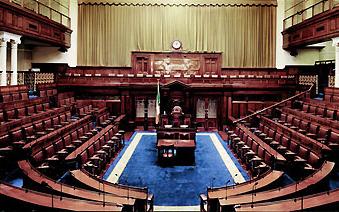Our irrelevant Dáil

For all their talk of reform, Labour and Fine Gael are as committed as their Fianna Fáil predecessors to maintaining the Dáil as an tool of the government of the day, accountable to no one. By Vincent Browne.
The Dáil met at 10.30am on Friday last with the usual affront to those who do not share a Christian belief, in the form of the “Paidir”, and, immediately, Éamon Ó Cuív sought to raise an issue to do with misleading information that had been given to the Dáil before a vote was taken on the Water Services (Amendment) Bill.
Leas-Cheann Comhairle Michael Kitt would not permit this, saying the only matter to be discussed that day was private business. The Government Chief Whip, Paul Keogh, intervened to say: “Deputy Ó Cuív had his chance yesterday. Throw him out.” After a few more exchanges the Dáil sitting was suspended for five minutes, and on resumption Ó Cuív sought to resume his point, claiming the House had been lied to on Thursday.
Kitt got very exercised about this, saying: “Any allegations about misleading the House cannot be made in the Dáil.”
Ó Cuív repeated his point, this time saying merely that the House had been misled the previous day.
Keogh again intervened and said: “Have him withdraw the remark.”
Mattie McGrath got involved and the following exchange took place (with attempted interruptions by the Leas Cheann-Comhairle):
Keogh: “Sit down, Mattie.”
McGrath: “Excuse me. How dare the Government whip tell me to sit down.”
Keogh: “How many fivers?”
McGrath: “They are saying something about a fiver. Would the chair ever ask...”
Keogh: “Did the deputy get travelling expenses?”
McGrath: “They are making allegations about fivers or something. They think the people are fools altogether.”
Timmy Dooley, Fianna Fáil TD for Clare, then made a reasonable proposal – that the party whips meet for 10 minutes to sort out the difficulty from the previous night’s vote on the Water Services (Amendment) Bill and that the House be suspended for 10 minutes to allow this to take place. The Leas-Cheann Comhairle wasn’t having it, as Dáil procedures did not allow for such a suspension when the agenda for the day had been decided already.
Michael Healy-Rae said: “The chair is getting very big for his boots very quickly and would want to be brought down to size. He is getting very arrogant.” He was asked to resume his seat but he persisted: “Was the House misled yesterday? That is what I want to know.”
McGrath said the House had been told a lie the previous day. Keogh said: “Throw him out, a Leas-Cheann Comhairle.”
The sitting was suspended again at 10.47am and resumed five minutes later for a debate on a private member’s Bill on a minor piece of local government reform.
Opening the debate on this, Neil Collins of Fianna Fáil said the Friday sittings of the Dáil were a sham. There was no Order of Business on Fridays, no Leaders’ Questions, no votes, no debates on current issues. The only point of Friday sittings, aside from the optics, was to allow debate on Opposition legislative proposals, which were almost always voted down by the Government’s overall majority, so there was no point.
The Committee of Public Accounts had been informed on Thursday that the Friday sitting cost €90,000 per day and was a waste of money.
A debate on the local government Bill went on until 1.10pm, to resume on Tuesday at 2pm.
The institution of Friday sittings is the most prominent feature of the Oireachtas reform which Fine Gael and Labour promised in the election campaign 11 months ago.
A few Labour TDs, aided and abetted by a Minister, Pat Rabbitte, managed last week to have a Cabinet decision on DEIS schools reviewed by the Minister for Education, and to some this is indicative of the prevailing predominance of parliament.
It is no such thing – merely a random instance of a few backbenchers having a bit of clout, when supported by the random support of a Cabinet Minister, who was privy to the Cabinet decision in the first place. Isn’t it extraordinary that our parliament has never discussed the subversion of the EU’s institutions in the management of the EU financial crisis? All the more so since the EU is now the primary seat of governance relevant to Ireland.
The proposed fiscal union might have been an issue for debate to frame Ireland’s position on a measure that, in some of its drafts, presumes to dictate to us how our own Constitution should be amended.
An independent public inquiry into the banking crisis, now well into its fourth year and posing a growing menace to the welfare of Irish people, might have been the subject of a motion, since the Oireachtas itself is – quite properly – debarred from holding such an inquiry.
Indeed, a debate on the very irrelevance of the Dáil itself might have diminished its irrelevance – all the more so if it agreed how the Government could be meaningfully accountable to it.
But not a bit of it.
This Government is as committed as previous Fianna Fáil governments have been to maintaining parliament as the creature of itself, the Government, thereby ensuring the government of the day remains unaccountable to anybody from election to election.
Image top: OpenDemocracy.
